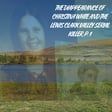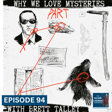Introduction to DEIB and Belonging
00:00:00
Speaker
People talk about the importance of you know diversity, equity, inclusion, and now they had belonging there. And I think belonging is the one that is, in some ways, the easiest to do and the least controversial. you know For me, belonging is being interested enough in another person to engage them around their stuff, whatever that happens to be. and Again, I mean their appropriate stuff so that they feel like they can bring that you know into the environment, where and whether it's work or a social organization um or charity or whatever we happen to to be doing. in That doesn't take a heck of a lot of effort. It takes intentionality, by the way.
00:00:42
Speaker
It does take intentionality for most of us. I'm not wired that way. I have to think about it, but it doesn't take a huge amount of effort. It just takes a little bit of thought. And so one of the ways I do it is in environments where I feel very comfortable myself, I tend to be much better at helping other people feel like they belong. And one of my kind of growth edges for the future is really trying to align myself with people in places where I don't feel as comfortable, where I don't feel like I belong that much. Because my theory is they may not either. And together we can create an environment where we do belong.
Belonging and Leadership with John Mitchell
00:01:21
Speaker
That's John Mitchell, an executive coach and attorney and the founder of KM Advisors.
00:01:28
Speaker
This is the Silver Linings Handbook Podcast. I'm Jason Blair.
00:01:46
Speaker
John Mitchell is a lawyer, a leader, and the owner of KM Advisors and Quandary Consulting. John is an organizational strategy consultant and an executive coach. John is also a graduate of Northwestern University School of Law and co-founder of the Chicago Bar Association Leadership Institute. Known as the purple coach, John specializes in helping law firms and helping lawyers and leaders discover and maximize their potential. Since the start of the COVID-19 pandemic, John has been a sought after speaker in many different industries, including healthcare, care transit, international development.
00:02:25
Speaker
John and I have worked together as colleagues and our companies have collaborated on helping leaders build self-awareness about their impact on others, targeting behaviors for change and internalizing those changes. Today we're going to have a discussion that goes broader than lawyers and deeper than work and goes into our sense of belonging. We share a belief that better leaders do make better lives for employees and organizations, and better employees and organizations lead to a better world. But we also believe that there's so much more to life than the work.
Jason Blair on Belonging's Impact
00:02:58
Speaker
Today we're going to talk about building and finding the sense of belonging.
00:03:18
Speaker
So, John, I just wanted to thank you for coming on the podcast for the second time. um You know, over time, you were one of our earliest guests. And over time, the episode that we did on the well-being of lawyers has become quite a popular episode. And over that time, I've had a lot of attorneys and ah leaders in the legal profession reach out to say that how helpful it's been. And then a couple of there's one example of a law firm in the UK that made it required listing for their for their managers. And, you know, around that time we were also having separate conversations about the importance of belonging. And you know enough about me to know that, you know, while I'm an outgoing person, sort of like having privacy and being able to focus on things is super important to me. So one of the things I have to push myself on is building affiliation and belonging um for my team. And, you know, that's one side of the coin. But the other side of the coin for me is that having a sense of belonging and a sense of community has been so important to me as a person.
00:04:29
Speaker
um even though I don't necessarily know how to build it. So I'm really looking forward to having this conversation.
Wellness in the Legal Industry
00:04:36
Speaker
Well, thanks Jason. I'm excited to be back and always enjoy chatting with you. So I'm looking forward to that as well. And thanks for sharing the feedback. That's the first I heard that a law firm made that podcast required listening. I like that. yeah Yeah, no, because i think it I think one of the things that really struck people is that they're not used to hearing people who are attorneys in the legal profession really talk about well-being. Somebody described it a bit like accountants. like were We're all too busy like at the big accounting firms or consulting firms, too busy working to really think about the impact of work on us.
00:05:12
Speaker
Well, the good news about that is ah there are accounting firms that are thinking about that now. And the legal industry is definitely thinking about it. In fact, I was on a um ah fireside chat with some folks, one of which was the chief wellness officer for Deloitte. Oh, wow. She tells a great story about how she got that title. It's because she wasn't well. and Deloitte was supportive and she you know went on her journey and she came out on the other side in a good place. And now that's that's her job is to actually focus on that inside the massive you know organization that is Deloitte. So it's it's definitely something that is evolving. And in the legal industry, I have to tell you, I'm really excited because what's happening in legal is they are now calling it wellness instead of like lawyer assistance programs. And so the focus tends to be more on the positive
00:06:02
Speaker
you know preventative, living your best life. you know As opposed to picking you up by your bootstraps because you've fallen. Exactly, exactly right. and so I think more people are embracing the idea of of wellness and well-being in the legal industry, even people who in the past you would have said, yeah, they would never do that. I think people are embracing it now because the language, the whole mindset about it is shifting. and I think it's a shift into a very positive place. No, that's awesome.
Personal Stories of Racial Identity
00:06:30
Speaker
You know, a throwback to our previous episode, I remember, and I'm thinking about this in the context of belonging, you had talked to about growing up sort of half white, half black in different kinds of communities. You talked about living in Boston and how the impact of that was and how different it was. um
00:06:48
Speaker
you know, in the because your dad was in the air Air Force in those environments. And, you know, I had talked about being black and at different times like when I was in Atlanta or and also when I was in Northern Virginia, growing up ah surrounded in white communities. And, you know, I don't I don't know if I talked to you about this, but I think, you know, the church provided a sense of belonging for me at one point in life. My profession as a journalist provided um I sense of belonging even sort of like the work i do or the podcast communities that i'm a part of provide some sense of that and i was just wondering whether you know your experience is growing up impacted or give you insight into the. Importance of four how can find a sense of belonging,
00:07:38
Speaker
yeah So let me just, before I share that, say that um having listened to a number of your podcasts and um especially the one, I think it was at the end of last year, its it was kind of your recap podcast where you talked to a bunch of people that had been on in the past. Yeah. It was super obvious to me, by the way, and I want to call this out because you just mentioned it. It was super obvious to me that you have found a sense of belonging in the podcasting community, in a particular in some of the true crime and other you know subgenres within that podcasting community. I could hear it in your voice. I mean, it was hard and was super obvious to me. Oh, that's interesting. And I think that's very, I think that's really born out for me in the sense that I didn't realize. I don't want to say that something's missing, but I didn't even realize how important that was for me until, and this is, you'll find this interesting in, you know, October and you know this, my mom died. Yeah. And that community, you know, rallied to my, uh,
00:08:37
Speaker
rallied to my support in those small ways that happened in the background, but are so meaningful. And it just dawned on me, I am actually a part of a community here that I didn't realize I was part of. Yeah, no, it's it was like I said, it was very clear to me, listening to that year end recap, that it's that you're not just a part of it, um you're it's a big part of you, you're a big part of it, and and that you clearly feel like you belong. And so that you know is maybe a segue into answering your question about you know my growing up. my My earliest experiences with belonging are mostly negative. You know you talked about Boston, so that's where my father's family was from. And although I didn't really live there, my brother and I would spend summers there when we were very young.
00:09:21
Speaker
And that was an environment you know that I mentioned to you in the past was in some ways kind of negative for me in that you know my brother and I weren't really accepted there. We were told that we were white kids um or we were Oreos, black on the outside and white on the inside. which in some ways was a fair comment because to that point of our lives, we had lived in majority white communities every single day of our lives, except for the summers that we might spend, you know, in, in Roxbury, Massachusetts. And so, well, that was, as a small child, you know, that's very confusing to have people say things like that to you and not understand why in the military environment, we were called black kids. And then in, you know, Roxbury were called white kids or Oreos, you know, that was,
00:10:03
Speaker
You know, very confusing. What wasn't confusing though was we both had a sense that we didn' we didn't fully belong in that community. And it was interesting because as I got older, so racial communities are an interesting thing when you are a mix of different races. Because as I got older, there was also plenty of times in my majority white communities, it was also very clear I did not belong. And so as a child, imagine how isolating that can be if the community that you primarily live in says you don't belong. And then the community that they that the majority community says you're a part of and you go to that community, they say you don't belong. That's kind of a tough place to be. Where do you belong?
Fostering Belonging in Teams
00:10:46
Speaker
Yeah. And it probably almost feels like the only place you belong is with maybe your family or your sibling or
00:10:51
Speaker
Exactly. like That nuclear family gets to be you know kind of a big deal. and Because of our military you know lifestyle, ah we were a nuclear family. We didn't have this giant extended family that we saw all the time. I mean i had relatives, but they were not living with us in Panama or living with us as we moved around the United States or overseas you know to England for high school. and so As a result, that nuclear family was maybe one of the constants around a positive sense of belonging. you know You have siblings, you don't get along all the time. so Sometimes that belonging isn't as great as you want it to be, although I will admit that that was one of the um ah places that occurred.
00:11:35
Speaker
yeah On the positive side, one of the places where I started to observe things were different, was certain sports teams that I played on. So I played soccer, I played baseball, I was a swimmer. and And it's not that every sports team gave me a sense of belonging. In fact, the opposite would probably be more accurate. There were some though that did, and I started to realize after the fact. I didn't realize it in those moments. I just knew I felt different. But after the fact, I started to realize you know something happened there that created that sense of belonging and that I would look backwards and try to figure out as I age, you know what was it? One of the things I realized is you know sometimes it was the the efforts of one person
00:12:20
Speaker
to understand and embrace difference, make all the difference in the world. And sometimes it wasn't one person, sometimes it was a group of people, sometimes the entire culture of an organization or a team might be about you know embracing everybody and and therefore it's easy to feel like you belong when you know you and everyone else who are very different are all being embraced. But there was other times where I think one individual was making the effort and we'll probably talk about this later but that was a lesson for me is the reminder that like one person can actually make a huge difference in this whole idea of belonging.
00:12:56
Speaker
That's very, it's really interesting that you say that because I can think of an example at work where, you know, in my current job where we had, and and you know, Brittany, we had, when Brittany worked here, you know, she she left earlier this year to go, you know, onto the next best thing for her. One of the things I noticed when she was laugh ah left was there was this glue that was missing that I didn't even realize um she was providing. And then in that previous example, when my mom passed away, it really started with, I realized that there were many people that were around me that were a part of that sense of community, but it really, really started with one person, one woman who is a listener who reached out after my mom died that made clear to me that I was a part of this community more than I even realized. And
00:13:49
Speaker
you know Until you said that, I really hadn't thought about how the idea that When it comes to belonging, one person can make the difference or be the bridge or help open your eyes to it or or or can hold it together within the entire
Role of 'Glue People' in Culture
00:14:03
Speaker
group. Because, you know, one of the things any large group that you're a part of, there's always going to be someone who's negative or harmful, but they can be, I guess, crowded out by the culture of the group or an individual person or collective. That's interesting to me.
00:14:23
Speaker
Yeah, and so what's really interesting about it is like in my environment, the the legal environment, all of the bigger law firms that I deal with, they have people, and they use different words, but you use the word glue, and a lot of them use that word. These are the sticky people. These are the people who help weave the fabric, the threads together into a fabric of the firm. And what's been fascinating to me from a cultural perspective is watching some of these firms grow, and become overly focused on compensation and especially compensating their rain makers and making sure that rain makers are paid at the top of the market, even though they're not built at the top of the market.
00:15:02
Speaker
you don knowt perform at the top of the market, but they still feel like they should be paid at the top of the market. so As these firms focus on that, you know and on some levels as a zero-sum game, they're pulling you know dollars from someplace else to pay these other people more. and you know What happens is people who bill a lot but don't bring in business, they still generally do pretty well in some of these firms. But someone who brings in a little business, bills pretty well but not great, And it is the glue is often the person that gets forgotten when it comes to compensation or at least neglected when it comes to compensation.
00:15:33
Speaker
And I've seen a couple of examples of some of my regional law firm clients where they've had a series of these glue people leave. Some take early retirement, some just say I'm done. Some actually just go into another profession. But if more than one leaves at once, it's often very palpable within the organization. Like, whoa, just like you said with Brittany, like, wow, it's different here.
Hiring for Belonging: Introverts vs Extroverts
00:15:56
Speaker
Yeah yeah it's not the yeah where it's not the same anymore and that's it's really interesting because I don't think I would have even picked up on it you know I picked up on the fact that there's something special about her to our culture but not that piece of it and I wonder whether is there a way as organizations
00:16:17
Speaker
um As leaders of organizations that we could even look to make sure we have those people like cuz I don't even know if you could tell in a interview process or ah you know what I mean like is there a way is it I wonder whether it's values to that. that play a big role in that. I think values do play a big role in it. And that those those people who are sticky often have personal values that align with the organizational values, which is one of the reasons that they're willing to spend so much time and effort connecting with people, even though they rarely get paid for it. And and by the way, when I say connecting with people, I don't mean just connecting with others, so they have a bigger network. I mean, they are connecting
00:16:59
Speaker
people within the organization and helping them feel a sense of connection, which I think is one of those things that leads to a sense of belonging. And so those people are really important. And I think leaders can look for that in their organization. And then I think the way you start to interview for it is a little bit of reverse engineering, you know finding the people in your organization that you think are the sticky people and then trying to observe what are the behaviors that they use that they exhibit that you think creates the stickiness, and then is there a way to test for or ask about those behaviors you know in an interview process? Oh, this is a really good point, because you know two things come to mind. One, I think it's so much of the little things, right? like that's you know You're the new person coming to the office, and the person that you're talking about says, oh, have you met this person? Have you seen this person? Or using Brittany as an example, she would do little things like,
00:17:58
Speaker
go and arrange people's offices before they came in and take pictures of the different things that were in there and her showing them what they were or like suggesting ideas like, hey, let's all get together for a lunch in the office or whatever it was. And I don't know how you figured that out in an interview, but so when I hired for her replacement, the foundation of me hiring for her replacement was to look at her psychological assessment. And look at her values profile and I hired against that so every person that was interviewed and made it as a finalist we assessed and then compared it and I i think you know i it's not that the profile would have been the most defining factor because obviously there's interviews resume life experiences that played a role in it but the person who was hired.
00:18:53
Speaker
to go into her position was the one that most matched her profile. That's interesting. And you have the advantage too, Jason, of using these assessment tools regularly in your business and then also using them on your business, using them with your own people. I think for employers that do not do this as a regular you know part of their work, they can still observe behaviors and then look for those behaviors in people that they're interviewing. And one way to do it, for instance, just a simple, ah simplistic way is asking people that you're interviewing, you know, in your last job, how many friends did you have there?
00:19:28
Speaker
and you know, if they've moved a lot, maybe ask them about their last three or four jobs. And, you know, if it's one or two people, it's probably rare that they're the glue. Yeah, yeah. And it doesn't mean you would hire them for something just means that particular role is probably not what they're going to be best at, you know, finding
Personality Traits in Leadership
00:19:45
Speaker
out how they operate. So here's another really good example, um I think of where you didn't want to be careful with an assessment. So let's say you're using a personality assessment, and you're looking at introversion and extroversion. I think the the the predominant model would suggest the extrovert is going to be the person that is going to be really good at making people feel welcome and help them feel like they belong. They're going to be the glad hand. Hey, welcome to the firm. Come here. Let's go to lunch together. You should come out and join our softball team and yeah all of that. The reality is, for a lot of folks, that introvert is probably going to be better. you know They're going to think very carefully about their connection with this new person.
00:20:23
Speaker
they're going to plan their interactions with the new person. And then most importantly, they're going to listen at a very intense level. Yes. yeah The person tells them. And then they respond based on what they just heard, not what they thought they were going to hear, which is what you know me, Joe, extrovert, I'm having 100 conversations at the same time and not listening carefully to any of them. You know, the introvert can be really good. So I personally think that, you know, from an employer perspective, who's trying to create glue, I wouldn't over rely on that larger than life person who is the life of the party, because they might be fun for everybody. It doesn't mean they're making everybody feel comfortable, safe, secure, belonging, you know, in that organization. Whereas that introvert might be the person that makes you feel like you belong. They always ask you.
00:21:09
Speaker
about this obscure hobby you have. They always ask you about something else that you do that's important to you that a lot of other people don't pay attention to. him It's interesting you say that because that's where I sort of think like personality values play different roles, like taking my own me as an example. you know When I get stressed out, I'm less of an extrovert, but the general me is pretty outgoing, um engaging, but you know my value of affiliation with people is very low. So what I would say if I were to go and do my own analysis of me
00:21:46
Speaker
I will come off in an interview as an extrovert. Chances are I will come off as an extrovert, but I communicate for the purposes of getting things done. I vigorously communicate for the purposes of getting things done, but that's not necessarily ah vigorously communicating for the for the um for a sense of belonging. However, when I get stressed out, I'm more likely to like pay attention and listen and hear those things. But in the normal me, the day to day me, you you would perceive me as an extrovert, but you would be mistaken to think that I'm doing that to really... i Mine's very goal oriented, if that makes sense. Yeah, it does it does make
Balancing Goals and Belonging
00:22:32
Speaker
sense. And the more goal oriented you are, I think that in many cases,
00:22:36
Speaker
the especially as you get out toward the extremes on this range, that in many cases you are losing the essence of the person and therefore they don't feel as much like they belong. They don't feel as much as as being included because they're really just a cog in the machine at that point, a highly functioning machine, but a cog. And none of us want to be a cog. And so that's why I think it's important to always be able to, you know if you're in business to make money, you got to get results. And at the same time, I think you get better results if you can really focus on the individual and help them bring their authentic you know selves to work and and embrace that and and find ways to make it work for them and for the company, because then they're going to feel like they have that sense of belonging you know to get more and better things from them.
00:23:26
Speaker
I wonder whether those two things kind of run against each other that every company does need very goal oriented, directed, you know, decisive um people in it, but they also need that glue that you're talking about to hold it together. And I imagine, you know, we know from the research that it's those goal directed, outgoing people who tend to get noticed and get promoted and that those who do as one. um You know, we have an unconscious bias, right? Like, if we don't see people who want to have high power careers or are coming up with authority who are super good outgoing, you know, that might be a blind spot for for us because of our unconscious biases that, A, I was successful, so you'll be successful. And I think like, yeah maybe the ideal person is a person who sort of
00:24:17
Speaker
you know, sees the big picture, is willing to help people out, you know, it really cares about helping others and also having people feel like they belong. Like, and I wonder whether how somebody, and I think the example I gave before is like, you know, I didn't realize ah that this person was so key to our sense of belonging. I wonder how someone like me, and and I'm in this profession, right? I'm in the profession of analyzing these things and understanding that diversity is important, but I wonder how somebody like me even gets to the point where we recognize the importance of it. You know, I have a friend, I quoted her recently, and she said to me that you don't figure out how a clock works by looking at a clock that's working. You look at a broken clock.
00:25:06
Speaker
um and I wonder whether for someone like me, seeing the absence of it helps me reverse engineer this thing I need or that we need as a team. I think seeing the absence of it at a bare minimum is going to remind you the importance of it. like You can compare and contrast organizations and go like, wow, this organization has a lot of sticky people and they seem like they function better. They have less turnover, for instance. um They have higher productivity rates. They have more innovation you know and creativity. and So those are things that if you see the absence of it, it's probably going to cue you that, hey, Jason, you need to start focusing on how do we get more of that. And I think that you know one of the things that's challenging is if you have an organization built around people who are completely focused on relationships and ah and then other people who are completely focused on getting things done, I think by having the two together, it's going to solve your problems.
00:26:01
Speaker
And then what happens is under stress, both groups default to you know their their default mechanism. So the relationship person is going to default to relationships, and the results person is going to default to results. And the danger of that, from my perspective, is the results people in particular can say and do things where there's no attention behind them, but the impact is devastating. Oh, yeah, yeah. I actually would want my results people to still have the ability to understand the power of relationships and be able to flex their own style appropriate and focus on that relationship. Yeah. On belonging, rather than saying I have a separate relationship person from my results person.
00:26:45
Speaker
You know what's really funny, Sean? One of the ways that I address this, you know, I moved my office around, so my desk was no longer in the corner of my office that was further to the door. It was right up in front of the door, and I still will close it at times, but I want to signal to people, and I face the door now, and I'm really close to it. I want to signal to people that I'm available to them because my body language or the way that my office was set up um kind of ran against that. so But when I am really stressed out, what I will do is I will schedule time to just reach out to people. Just schedule time to walk the halls. um Because I know it's not naturally gonna come to me. And by putting it on the calendar, ah hopefully they haven't figured out what time it is. But putting it on the calendar gives you this opportunity to do it.
00:27:40
Speaker
No, I think that's a really smart idea. So there's many people who you know the the idea of management by walking around you know this is actually fairly popular. And there's some people, they just naturally do that. And what you're pointing out is you don't naturally do that. And so for you, what's most important is that you do put in the calendar so that you actually do it. And what you've learned over the years, and the reason you put in your calendar is, it works. Yup. Yup. And it has, yeah, you see the impact. I remember, i I don't know if I've ever told you this story, but I'm trying to think women when this was. It may have been in the second year of the pandemic, I was on the phone with um
00:28:16
Speaker
this sort of like expert in business development who's done some work for us. And um the the topic of childhood came up and she and She had been adopted. She had, you know, had a relatively um difficult difficult childhood. She had gone off to do human rights work during the um war in Yugoslavia and probably had some traumatic experiences there. And we were just talking about childhood and I was telling her about my childhood. And I i i mentioned that when I was a kid um or teenager,
00:28:52
Speaker
I had been a part of church communities my whole life and my family, a lot like your family, because my dad worked for the federal government, we moved a lot, right? But the constant was we were a part of these church communities. youth groups, um and and I had said like one of the toughest moments of being young for me was when you know I had started asking questions, because I'm just a naturally inquisitive person, of our Sunday school teacher, and she couldn't answer them, so then the Sunday school director came in, and he gave his answer, which to me like wasn't logical, didn't make sense, but very nicely I pointed it out to him, and he basically said, not basically, he actually said,
00:29:34
Speaker
you know the devil causes division. and That was the beginning of my walk away from the church, that one little moment. She said, it's a big deal because it tethered your sense of belonging. It ripped your sense of belonging. and I had never really even thought about
Identity, Self-awareness, and Belonging
00:29:52
Speaker
that idea. and Then later in my career, you know when I made my mistakes in journalism and had to leave that community, i lost and and I didn't even know it lost another sense of belonging and identity and connection.
00:30:11
Speaker
and you know I realized in retrospect that i even though I didn't know it, I was seeking a sense of belonging. But I also realized I may not always know how to create that sense of belonging for people even though it's really important for me. I think it's an important point. it's It's important for each of us and it's important we find ways to help create it, you know, in others. I think your friend was, you know, spot on that, you know, when we lose these places that are important to us where we, you know, for me, the idea of belonging as part of it is I can feel so comfortable someplace I can just be myself, whatever that is. and And there may be other things like for you and your faith community, there may be, you know, concepts there that were really important to you. And then as you saw contradictions like
00:30:57
Speaker
comment that was made, um it starts to just take you out of that you know community and you no longer feel as comfortable and you no longer feel like you belong in the same way. and That's a big loss. Yeah. Yeah. Yeah. And it's it's almost sort of like an unexpected one because you move on to the to the next thing and actually right around that time, just thinking about this for the first time, it's kind of like when I found um journalism as a career and that kind of took over, right? Took over in comparison. um But maybe that wound was entirely
00:31:32
Speaker
entirely ah heal I mean, i and I know we're driven to this need, right? Your point before about introverts or extroverts, it's easy to think of the extrovert that way. But I think that we're all relational people, like the way that we understand ourselves, the way that we understand ah other people, the way that we get things done through other people is all about ah belonging. And I think of a recent example that I've run into. with this friend of mine who probably for the first time in her life feels a sense of belonging in a place. But I also think the it is a it's an unhealthy place because for a lot of different reasons, I think it actually in some ways makes her life.
00:32:19
Speaker
harder, right? And so I've i've been wondering recently and thinking about her because I don't want to say to her, Hey, you need to leave this community. Like maybe you need to get away from a couple people in the community. But like, how do you find that balance of your need for belonging um and balance that with your own wellbeing? Like i I can think of another example where, you know, you may get your identity from helping people, but you lose yourself. That's another example that comes to mind. um And people are so afraid in those situations, I know from working with leaders, if they stop helping people, all of a sudden they'll lose their place of belonging. And I just wonder, like, how do we find those places of belonging that are safe or how do we turn those places of belonging into safer or healthier places when when when that balance isn't right?
00:33:14
Speaker
It's a great question because you know you you gave a good example there of what I would call maybe a middle ground yet still inappropriate place where you get a great sense of your identity out of helping others and then you can lose your sense of self, right? um Because where I went when I was first you know talking to you about this whole idea is things like cults and hate groups that provide a sense of you know identity, a sense of belonging for people who are feeling like they don't belong someplace. and and in that sense of belonging is then turned and used to do some very dangerous and in I think we both agree bad things. And so your example is a better one because it's something that you know more of us but would probably see. And I think one of the things that helps us in these middle ground areas, like the person who you know really identifies with helping others and then loses themselves,
00:34:10
Speaker
To be in community with folks who feel comfortable that you know you get to be you and I get to be me and part of being me is sharing what I observe about you. You don't have to buy it. yeah it However, if we're in community, you need to hear it. and I think that person that says to you, Jason, you know I've noticed that you really take great joy and supporting other people you know on your team. And yet I also noticed that in the last two years, I've not seen you do anything for Jason. you know Is that something that you've you know focused on? No, that's right. It's funny you say that because i I have a friend at work who's like, so this has been like the year of vacations for me. I went to Ireland, I went to
00:34:54
Speaker
oh I'm going to Minnesota. I'm going to Salem for October. i Where am I going? um Or I've gone. I took a trip to Indiana. I've taken so many trips in part because my mom said right before she died, she said, live your life. um ah so That was good advice. Yeah, excellent advice. yeah and um I have this friend at work who mentioned you know I've been pointing out for the last five years, because we worked together for eight years, that every time you have a vacation, you cancel it to go deal with a fire or to help someone out or do something. I feel like the combination of my mom's advice and this friend, Abby, who you know, her advice um helped me find a better balance. so I think that's what we need. and and For me, that's part of belonging. so Being authentically you,
00:35:48
Speaker
I think of that as being the best version of me, not the current version of me. And hopefully I'm evolving into you know my best version. So I actually appreciated if somebody would say something like that to me, like, hey, John, I'd noticed that every time you have a big vacation coming up, you cancel it to put out a fire for someone else. Because the best version of me is going to be a whole version, which means I have to explore. I have to seek out new things. I have to learn. I have to relax. All the things that I can do on a vacation, that I'm not going to do date. I mean, I'm going to learn every day at work, but it's it's very, very different. And so I think that, you know, this whole notion of being authentic, you know, your authentic self and bringing your authentic self to work doesn't mean that you have to accept or want to accept, you know, limitations, warts, whatever they happen to be. It can be that your authentic self is evolving constantly, probably, hopefully.
00:36:45
Speaker
And in that it's okay to be in an environment where people support you enough that they want to at least raise different perspectives with you or point out you know some observations where you can then make a determination. Does that work for me? Does that fit for me? Is that valuable you know information to have? And like in your case, Jason, it sounds like that was helpful that somebody pointed out to you. Yeah. Oh. Anseling these important vacations to help someone else put out a fire. Yeah, and I feel like I've come back to work, um you know, more effective and, you know, in retrospect and thinking about it, I i i think
00:37:24
Speaker
It was like emerging of my desire to help people with fear that if I didn't do this thing, like show up for people or put fires out or whatever, this fear that I would lose my identity. And I think I realized, you know what? I was also undermining other people, right? And their sense of connection to the organization and you know I was accidentally sending the message, I don't trust you to put out a fire. Now, guess what? Over every one of my vacations, sure, there were fires in the last year. And guess what? My team put them out without a problem at all. um And so you know I was unintentionally sending the message, I don't trust you, right which undermines their connection with the organization. and And so I'm just thinking, like
00:38:14
Speaker
when you have those moments where you're operating out of fear, whatever that fear may be, right? Because it doesn't have to be the one that I have, that it can undermine connections within an organization or any group of people, friends, whatever it might be, family. And I don't just undermine it. So your need to belong is tied to identity. And part of your identity at the time was I put out fires for other people. And unfortunately, that helps you start to lose yourself.
Building a Culture of Belonging
00:38:47
Speaker
And that's what you know Abby is pointing pointing out to you um in in that situation. And so I think all of us have to be careful to not allow our sense of identity to get so tied to something that may not be the best thing for us.
00:39:03
Speaker
And again, I keep coming back to this phrase, you know ah bringing your authentic self to work, because it's it's used a lot you know these days in the workplace. I don't think that that phrase is a license to just carry your baggage forward. It's to solve that baggage. And you know you said something earlier about a a wound hadn't healed. And I was at a coaching conference last year, and I heard this phrase that was awesome. They said, you want to teach from your scars, not from your wounds. Mmm, right. The ones that have healed. yeah Boy, did that make a lot of sense to me. I see these people who are dealing with, you know, some trauma or something and they're trying to help others and they haven't resolved their own things yet. And so often I perceive that as like just icky or inappropriate at best. And what I was hearing from these colleagues at this coaching conferences
00:39:54
Speaker
When you've gotten to the point of resolution, um there's still a scar there. you know You can't ignore what happened, but you've learned to process it and and you can put it in a context and then learn and build from that as opposed to being in the throes of the thing, the wound, where you don't have the same context. You don't have the ability to stand on it and scaffold up, build up from there. And so it's one of those things that I think is really helpful is when somebody can point out to you that perhaps there's a wound, there's something that's going on for you. You can then decide if you want to do something about that, and if you do and you resolve it, you can get to the point where now you've got a asset, that's that scar is an asset, you've learned something, and you can do something different, both with yourself and with others, moving into the future. Whereas the wound, it's not an asset, it's a deficit at this point until you have
00:40:51
Speaker
healed the wound, it's actually detracting from you in most cases. It reminds me of that phrase, like put the oxygen mask on yourself for someone else. Like look inside and then build up. I love that. I love the scar versus wound metaphor. and I was going to ask you, what do you think the cost is to groups of people or organizations or teams um that don't focus on building that sense of belonging? And I kind of think of that in the context of like,
00:41:25
Speaker
Probably post covid thinking about all the changes that happened with remote work and you know did that get tethered and then even all those changes that happened with return to work. I wonder whether. That's given us some insight in that or exasperated it or ah what do you think happens when groups don't build that sense of belonging. yeah I think it's it's a big deal, and I think we have a little bit of research on this. Maybe there's a lot, I just haven't seen it, but at least there's some. you know One of the things that I think that we know about belonging is that it can help fuel productivity. So if you don't have a sense of belonging, your productivity goes down. So from a purely mercenary standpoint as a business leader,
00:42:06
Speaker
not creating a sense of belonging in your people is going to end up in reduced productivity. And you may be happy with your current level of productivity. However, if you can get more and you don't have to spend more money to make people feel like they belong, you have to spend time, but not necessarily money. It doesn't have to be a lot of time sometimes. right So I think the productivity is one that gets a lot of business people's um attention. Another big one that HR is always focused on is turnover. if If I don't belong, and I know I don't belong, I'm going to try to find a way to meet that need. Like we all have that need to belong. So I'm going to try to find a way to get that need met. And eventually, I'm going to realize I have to find it somewhere else and I'm going to leave. And so that creates turnover. And in a down economy, it may take me a long time to decide to leave because I'm scared that I don't have any other choice. I'd rather be in a bad place than no place.
00:43:00
Speaker
as the economies get better or as my skill set increases or becomes more valuable in a particular market, I have more opportunities. And so turnover can happen quickly. And you know depending on the skill level of a person, you know a clerical worker can still cost you 150% of their salary some time to get it replaced. And think about your highest in knowledge workers. They're way more expensive than that to get them replaced. And the total total dollars is even higher too. so The turnover is another thing that I think kind of your, let's say your results oriented business leader might look a lot at. I think another factor that it's even more important, it's a little harder to quantify and and that is creativity. you know When you don't feel like you belong, you don't bring your best you know self to work.
00:43:51
Speaker
And so there's not that you know diversity and in in intersection of all of these you know creative influences coming together. like There may be one person who's being creative and everyone else is like, okay, tell me what to do with that. I'll go make it happen. Amazing. And I imagine like another example is like you know there is a cost to taking a risk. you know Am I, if I don't feel a sense of belonging, gonna be willing to walk out a little bit further on that um on that ah on that diving board? It's a great analogy, because yes, there's and again, that's something we know from science is there's a risk reward, you know, spectrum here, and the the biggest rewards are going to come from taking some risks. And, you know, being innovative is almost always taking a risk. um And so if you're in an environment where you feel that psychological safety, you're going to have a sense of belonging and you'll be willing to take those risks. And most importantly, they'll take them day after day after day.
00:44:49
Speaker
It's not taking a risk once in a blue moon. That's not likely to hit the right confluence of other people taking risks too and like um you know these these ideas come crashing together and yet something totally new comes from the crash of ideas. If you do it on a regular basis, it's much more likely that at some point we get one plus one equals three. And I wonder whether this is even more important than like things, people being nice, right? Because, you know, conflict avoidance, so it doesn't always have its upside. But when I think of companies like
00:45:21
Speaker
I don't know, Apple, or I think of companies that were people really, you know, top law firms or people feel a real sense of connection to the organization and feel safer, they may bring more, if that makes sense. I think they always bring more, yes, absolutely. and In some levels, that's almost free, like you're not paying them. extra to bring more. right right Giving them something that makes them bring more, which is that sense of belonging. And and you can consciously focus on that to to create a better sense of belonging, I think. That, though, is not giving somebody more money to now be more innovative in your organization. Do you think that people can build a sense of belonging regardless of what level they are in an organization like non-leaders, leaders?
00:46:17
Speaker
I do. In fact, I would argue that everyone needs to be a leader. so Leaders, are for me, are not about titles. It's about roles. Do you influence and do you impact other people? If you do, in my book, you're a leader. and so the the person so I'll give you an example. Sylvia, she's the receptionist at a law firm, um client of mine in Washington, DC. Sylvia is not just welcoming. like That's what you expect a receptionist to be. right She actually makes you feel like you belong. She makes you feel like you're a part of that organization, part of that law firm. and Think about this, most people that she runs into on a daily basis are writing massive checks to this law firm.
00:46:58
Speaker
So making them feel like they're part of it is a gift. Yeah, like normally they're bringing a problem and they're writing a really big check. Yeah, a but ah probably a stressful problem and paying out for it, right? Exactly. And she is, I watch her and she is very, very clever at what she does. And by the way, sincere. This is not a game. This is who she is. um But it's something that she she does. And so i I think that, and I point this out to this firm all the time.
Inclusivity in Everyday Interactions
00:47:26
Speaker
I'm not sure they always listen to me when I say, because I'm basically saying you should write her a nice bonus check. Just say thank you and do something nice for her. And she is really impactful. And the reason I pay attention to this is I watch how she deals with me when I'm there. And she literally treats me like I'm a member of this firm. I'm not. I sell them services, right? So they're writing me a check.
00:47:50
Speaker
However, she makes me feel like I am a member of the firm. And one of my favorite stories about her is this, I can see National air Airport from their offices and I often fly in and out of you know DCA. And so there's been times she's come in to me and said, you know, hey, Mr. John, I think it's time that we stop your meetings because I know you want to get home and see your wife. And if we don't get you out of here soon, you are not going to catch your flight. Wow. She said that in the nicest, sweetest way. She's managing me. And she's encouraging me to go in a way where I know she cares, because she understands these other parts of my life, not just what I do for her firm. And she wants to make sure those parts of my life are going well. I remember when I first started doing mental health work, and you know I was starting my business, I had a colleague who said, ah the most important thing is who you hire at the front desk, because they interact with people more than you ever will.
00:48:46
Speaker
um They interact with more family members than you ever will, and that who that person is really holds together everything, and I never really even thought of that. But when I started doing it over time, like I realized that I would find out things about my client's progress from the person at my front desk that they would never even say to me, or and that was fascinating to see. Well, some firms do this with hiring too. They will ask like in New York, the car service driver, they use the same car services and they often have you know similar drivers. They'll ask them for feedback on the candidates they have. They ask the receptionist for feedback on the candidates they have. They ask the legal assistant who is escorting them you know around all their different appointments that day for feedback because those people are seeing things and learning things that um that you may not learn in your kind of elevated level. And the other thing that I take away from that is not only are they good sources of information,
00:49:40
Speaker
Those are people that can help others feel like they belong. And those are people who can tell you that the candidates you're bringing in don't care about creating a sense of belonging in the organization. They care about themselves. Oh, that's fascinating. It come brings to mind this story. you know our Our company worked with the Defense Health Agency, and I remember the first day we ever went in the a building to meet Vice Admiral Raquel Bono, who was the director of this massive agency, right? Like 100,000 plus.
Leadership and Inclusivity Examples
00:50:13
Speaker
And we sat down with her because our program was an initiative that she really cared about. And we were sitting in the small conference room. I think there were like seven people on my team there, right? Like people who were back benching on the wall, people who are at the conference table. And you know i did most of the talking in most in one of my other colleagues who worked at corn fairy international. Did most of the talking last thing she did in the meeting and we had about ten minutes left she stopped us from talking.
00:50:43
Speaker
And she went around the room and asked everyone, her people, my people, their views. So it was everyone from the senior consultants who were talking to the, literally to the administrative assistant that was on the back bench. And she didn't just in a perfunctory way ask them, she asked them follow up, she asked them, and you know, My team has never had more loyalty to a client than that one and i think it's because they felt like they were a part of it. That's a great story because it it shows you give an example of.
00:51:19
Speaker
why belonging is so important and also how easy it is to do. So, you know, one of the things I was going to say to Jason in terms of like leadership, I don't think you have to be a formal leader to make belonging, you know, your issue, but I do think leaders need to model it. And then more importantly, find champions, people in their firm who have a propensity to want to, you know, do this, that that's what they like to do. It's part of their DNA. And then find other people who maybe be are on the fence about it that you can tip over and and also do it so you can get more people focused on it. Your story there was a great example of one way to do that in a very professional context. Ask people their their opinion. Yeah. and The interesting thing for me is I've rarely seen leaders do it. and It was very funny because I like instantly started copying it as a part of my approach to to do it. and it um I think it really, really, really, really truly,
00:52:18
Speaker
that truly makes a ah a big difference. One of the things that I was also wondering about and kind of thinking about this piece of it, you know you had mentioned earlier that some of this can be cultural, not just the individual. um Is there something you can do to help build a culture from your perspective, whether you're leaders or other people, to build it into the culture? ah i I guess modeling, I guess you were kind of getting into that, modeling the behavior. Modeling it and also calling it out though so people understand. So sometimes when you model things, it's too subtle. People don't connect the dots. And it's okay if you're not trying to get them to follow your behavior, you just want them to see that you do something a particular way. But if you want them to follow your behavior and repeat your behavior, you need to connect the dots.
00:53:10
Speaker
And so I think that besides modeling that is you tell people what we want. So I had an experience recently where I was exposed to a private club and this is not my scene at all. Like when I was a young lawyer, all the partners I worked with belonged to clubs and we'd go to the club and I'd see people who looked like me and they were wearing black pants and a white shirt and carrying a tray. And you know, it was just awkward for me and I never liked them. And I just recently had this experience um where you know a friend wanted to just meet to another friend and it was going to be in this club.
00:53:44
Speaker
And it was so interesting to me because the the culture clearly has been, a tone has been set that we want to make people feel comfortable here regardless of whether they're a member or not, regardless of whether they look, act, think like us. Oh, that's fascinating. It was fascinating to me because I like i went into the bias against private clubs, first of all. mean I'll just be honest, not my thing. And almost to a person that I met, People were very warm, and very welcoming. And then if somebody found out I had never been to this club before, like, oh, well, let me tell you this really cool thing that we had. You should go check this out. And they then were basically going above and beyond just being polite and literally trying to engage me around opportunities.
00:54:34
Speaker
And they weren't trying to pitch me on being a member of the club. That was not ever going to be a possibility. ah They just wanted me to know that there was these things that I might find interesting based on whatever I just said to them, whether it's I've never been here before, or I expressed an interest in something. And I really found it interesting. And I'm going to debrief with my friend. This is very recent, so I haven't had a chance to debrief yet. ah But I'm going to ask the question, like, is this something that they do intentionally with their new members so they understand that is what we want to be part of this organization, this culture that we are welcoming to everybody whether they're a member or not. And my guess is they're gonna come back and tell me absolutely. Wow, so you you see you really think that those kinds of things are like intentionally embedded and it's not just the people, it's that there's an expectation and an explanation of the purpose of it. I think so, especially in this case, I really feel strongly that it's intentional.
00:55:31
Speaker
Because it's a private club where most people will never be able to be a member of the club. And so on some level, you don't have to care what somebody thinks when they come and go. Because they're not likely to be there very often unless they're doing business with you in that club again over and over. and And that was not even remotely the experience I had. it It was almost like we're not a private club. We're the welcome wagon for your local neighborhood. We want you to come and explore the neighborhood. everything actually, yeah, everything's actually yeah open here ah regardless of, well, and that that that leads to another question.
Diversity's Contribution to Belonging
00:56:08
Speaker
Like how important is valuing diversity to this? I think for belonging, it's it's critical because it's, forget what you believe about diversity. um If you have an organization that's more than about two people, two or three people, you're going to end up having
00:56:28
Speaker
people with various types of diversity, you know racial, ethnic, religious, gender, sexual orientation, thinking, political, you know all sort sorts of different things. And if you can't find ways to create environments where people, it's not just that they're included, this is why I like belonging so much, but when they actually feel like they belong, you can't leverage that reality. mean You may have them working for you, diverse people working for you, but they're not giving you their best right best ideas. You're not getting their best work. You're not getting their best creativity. and so it's It's just a reality in the United States, at least, that once you get past about three people, it's pretty rare that you would not start to see various types of diversity showing up in your employee base.
00:57:16
Speaker
Yeah. and and And without appreciation for that, I mean, you can balkanize things pretty easily, right? You can. And again, you can get away with it. There's companies that do. The challenge is you're still paying people for less than what they could be bringing to the table because you've made a choice that you're not going to focus on this. And so there's a real sort of like disconnection that can happen between the investment and the people, whatever you might consider that investment time, money, whatever it may be, you know, a disconnection between the investment and the, the, the, what they bring to the table. Yeah, I think it's a disconnection between your initial investment and then the rate of return on that investment. So the initial investment is I spend time hiring you, screening you, hiring you, onboarding you, and then paying you and getting you to go to work. That's my initial investment.
00:58:09
Speaker
And what you do for me at the course of this next year is whatever that is, right? If you would put a little bit more investment in there and helping this person feel like they belong, you will get a much higher rate of return because they will bring their best much more often. They will share their best ideas. They won't just mail things in. Like when you feel like you belong someplace, there's a sense of reciprocity, of mutuality that goes on. You and I don't have to be the same, but if we feel like we're part of the same community, I will try to help you be better and you'll try to help me be better. And that's when we start moving toward that, what I talked about before, one plus one equals three. Right. Right. Magic happens when you get one plus one equals three. Magic doesn't happen when one plus one equals two.
00:58:52
Speaker
Which is the whole point of us being in groups that we're better together. Otherwise, we'd all be independent. Exactly. Yeah.
Simple Actions for Belonging
00:59:00
Speaker
Exactly. So for me, this is one of the reasons that um I now like talking to some of my organizations about belonging and I purposely don't use any of the science, although there is a bunch out there. I purposely don't because what I really want people to take away and to think about is This can literally be one of the easiest things you do in your day. What can I do to make one person, and you can just target somebody, your assistant, you know the person at the front desk, someone in the mail room, what can I do today to help them feel like they belong? And then can I repeat that on another day and another day? And you don't have to do it every single day.
00:59:39
Speaker
However, you start to figure out like what works. what What are those person's needs? Are there appropriate ways to meet those needs in this office environment? If there are, that's one of the ways I can help create this sense of belonging. that is Yeah, that's a really good point because all it really does is taking focusing on one person. um yeah yeah Yeah, because it seems so daunting when you think about it in the bigger picture. but I think not. When you come back to what you were saying before that sometimes as one person who does it, what happens when it's 100 people doing it for one person? That's where it can become really
01:00:19
Speaker
powerful. I was just wondering, just sort of like in thinking about all of this, do you have any um sort of like closing thoughts or a message you would want people to take away about belonging? Yes, I do. I think that you know people talk about the importance of you know diversity, equity, inclusion, and now they add belonging there. and I think belonging is the one that is, in some ways, the easiest to do and the least controversial. you know For me, belonging is you know being interested enough in another person to engage them around their stuff, whatever that happens to be. and Again, I mean their appropriate stuff ah so that they feel like they can bring that you know into the environment we're in, whether it's work or a social organization um or charity or whatever we happen to to be doing. in That doesn't take a heck of a lot of effort. It takes intentionality, by the way.
01:01:17
Speaker
It does take intentionality for most of us. I'm not wired that way. I have to worry about it. But it doesn't take a huge amount of effort. It just takes a little bit of thought. And so one of the ways I do it is in environments where I feel very comfortable myself, I tend to be much better at helping other people feel like they belong. And one of my kind of growth edges for the future is really trying to align myself with people in places where I don't feel as comfortable, where I don't feel like I belong that much. Because my theory is they may not either. And together we can create something where we do belong.
01:01:57
Speaker
yeah Oh, that's a great point. This has been an awesome conversation, man. I'm looking forward to at some point having you back on and, you know, looking forward to continuing our working relationship together. Cause we can say a lot of things about you, but smart, thoughtful guy is one that definitely fits. So. Well, I appreciate that, Jason, and I love working with you. We've had some fun times together, and I'm definitely looking for more of those down the road. And I love the podcast. In fact, I told you before, I am so intrigued by all the twists and turns that your podcast has taken.
01:02:35
Speaker
Yeah, it's it's ah's
Jason Blair's Podcast Journey
01:02:37
Speaker
exciting. I mean, it's it's it's confusing to me, and yet it's exciting at the same time. Yeah, no, absolutely. like It's nothing you know nothing like what I thought it would the journey would be, and I suspect the next year will not be like anything that I i anticipate right now. and um Yeah, and it's been really meaningful. It's that part of life where, you know, you can plan all you want and you can prepare all you want. But if you sort of like open your ears and walk on a path, you'll find where you're supposed to be, not where you plan to be. Yeah. Yeah, I like that.
01:03:18
Speaker
If you would like to join us for more discussions with me and other listeners, we can be found on most social media platforms, including a listener driven Facebook group called the Silver Linings Fireside Chat.
Join the Silver Linings Handbook Community
01:03:30
Speaker
For deeper conversations with our guests and live conversations with other listeners, you can also join us on our Patreon at www.patreon dot.com forward slash the Silver Linings Handbook. I'm Jason Blair and this is the Silver Linings Handbook Podcast. We'll see you all again next week.




















